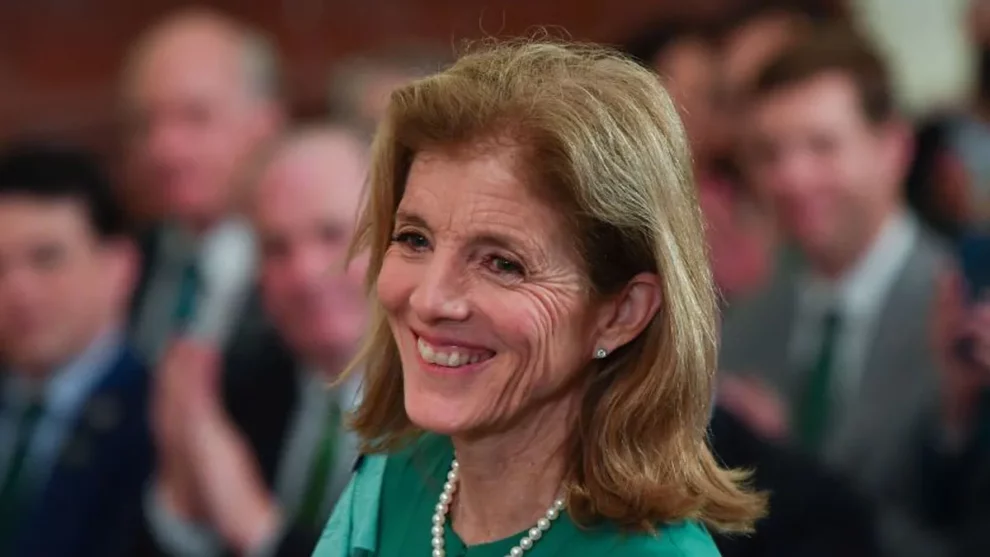US ambassador Caroline Kennedy says Australia will be able to count on America as a reliable ally in a crisis even if Donald Trump returns to the White House, adding she is hopeful Congress will this year pass laws to allow the transfer of America’s most sensitive military technology to Australia.
Congress is currently debating legislation to allow the sale of up to three nuclear-powered submarines to Australia, as proposed by the AUKUS agreement, and to grant its ally a broad exemption to tough defence export controls.

Amid rising concern at the prospect of US unpredictability under a second Trump presidency, Kennedy argued that overwhelming bipartisan support for the alliance with Australia would transcend the personalities in the White House.
“Everyone in the US loves Australia,” she told this masthead in the first extended interview of her term in Canberra.
Kennedy conceded there was “a lot of drama and attention” in American politics heading into next year’s presidential election. But asked whether Australia should prepare a Plan B in case of US unreliability under Trump, the ambassador said: “I think that foreign policy historically, and certainly now and certainly in this region, enjoys real bipartisan support. I’m confident that Australia should be able to count on us.”
Asked whether she was suggesting that Australia relax about the prospect of Trump’s return, she said: “I don’t know if I’d use the word ‘relax’,” but “everyone in the US Congress, everyone in the US loves Australia, appreciates Australia, [that] we have no more capable partner and ally.”
The two nations shared values, interests and goals, she added. “I know that what Australia and the US want is peace and stability.”
Kennedy said she was working hard to change US laws to enable the AUKUS agreement to be implemented as quickly as possible, including the sale of three to five of America’s nuclear-powered submarines, starting from 2032. But this is unprecedented and prohibited under US law.
Kennedy said there was “a tremendously complicated set of regulations and laws” that Congress needed to change, but that “hopefully, by the end of the year, it will be part of the Defence Authorisation Act”.
Senior Biden administration sources privately say that key legislation underpinning both of the so-called AUKUS pillars will pass this year, allowing the submarine transfer and deeper co-operation on other technologies such as cyber, electronic warfare, quantum technology, hypersonics, artificial intelligence and autonomous military capabilities.
While it may seem surprising that a Kennedy, as a member of one of America’s storied Democrat dynasties and the representative of Joe Biden, would defend Trump, “it’s fascinating and reassuring that she says that because it shows how committed her administration is to presenting a bipartisan front”, said Rory Medcalf, head of the ANU National Security College.
Medcalf said he found this comment “credible and reassuring” and “consistent with soundings I’ve taken inside the US system”, although “you can never be certain” about Congressional negotiations.
Kennedy said that Australia and the US needed to do more to help the Pacific island nations manage climate change. She starkly illustrated its effects through her family’s long connection to the Solomons Islands, where her father, John F. Kennedy, was marooned in World War II after a Japanese destroyer sank his patrol boat in August 1943.
“The island my father swam to is now two islands because of rising sea levels,” she said.
The ambassador recently visited the Solomons and recreated part of the ocean swim her father did before he was found by Solomons scouts and rescued by an Australian coastwatcher.
“Kennedy Island is half the size it used to be, so this is something that … doesn’t feel as urgent and imminent and existential in the US,” the ambassador said.
“There’s a huge effort going into this, but it can’t happen fast enough.”
Anyone who doubted that human activity was driving climate change should, she said, “just go outside in a tornado”.
Kennedy said that Australia and the US were aligned on many areas including democratic values, security interests and climate change but also culture, including a love of beer and sport.
“So I think, you know, that’s one of the great and most rewarding things about serving in a country that’s as aligned with the US and is just feeling that sort of joy in the partnership.”
Source: The Sidney Morning Herald









